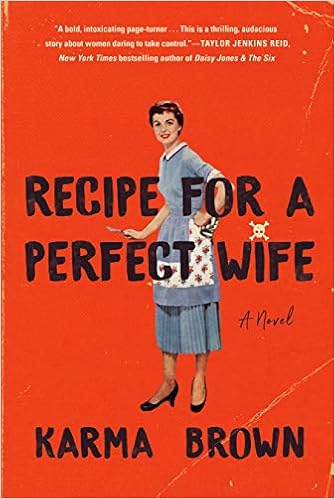There are two narratives in this novel. In the one set in 2018, Alice Hale has just unwillingly moved with her husband Nate from Manhattan to the suburbs. Having left her job, she thinks she will write a novel but suffers from writer’s block until she chances upon a vintage cookbook and letters left by Nellie Murdoch, a previous resident in the house Alice and Nate have bought. Alice slowly becomes aware of the secrets Nellie hid about her marriage.
The second story is set in the 1950s and focuses on Nellie and her life
with her husband Richard. That life
consists of little other than cooking, cleaning, and entertaining. Gardening is her solace, especially because
her marriage is not a happy one since Richard is domineering and physically
abusive.
As the title and dedication indicate, the book examines the
expectations with which women have had to contend. Certainly, women were expected to marry, and
one of the most interesting elements in the novel is the advice women were
given about fulfilling the role of wife.
Interspersed throughout are quotations from actual books offering advice
like “Be a good listener. Let him tell
you his troubles; yours will seem trivial in comparison” and “Happiness does
not flourish in an atmosphere of dyspepsia” and “Do your best to make him happy and you will find happiness yourself”
and “From the wedding day, the young matron should shape her life to the
probable and desired contingency of conception and maternity. Otherwise she has no right or title to
wifehood” and “your most important job is to build up and maintain his ego” and
“in case of an occasional lapse on
the part of the husband . . . forgive and forget.”
It is obvious that Nellie tries to follow this advice. She outlines her “education on what it meant
to be Richard Murdoch’s wife”: “the
most important thing she could do was stand by his side, take care of him, give
herself over to him bit by bit. He
needed her to look pretty, cook him hot meals, open her legs to him without
feigning a headache or lady troubles.
She was to keep her opinions to herself while also keeping his dozen or
so white dress shirts sparkling and clean of other women’s lipstick.” The reader cannot but feel sympathy for her;
she has few options.
Alice, however, does not elicit any sympathy. She constantly lies to Nate and keeps secrets,
even asking at one point, “What did it say about her, and her marriage, that
she hadn’t simply been honest with Nate from the beginning?” Her deceptions show her to be immature,
selfish, and manipulative. Her position
is nothing like Nellie’s because Alice has many opportunities to speak up for
herself but she doesn’t take them. Nate
is certainly not Richard because he is not abusive and allows his wife to
express her opinions. Granted, he does
make some decisions without consulting Alice, but since she chooses not to
communicate her feelings, she bears some responsibility for misunderstandings. Sometimes, Alice is just stupid: in 2018, an adult, who could not but be aware
of the health dangers, would take up smoking and even go so far as to cut off
the filters?
There are hints that the house is haunted by Nellie and that she gradually
is taking over Alice’s personality. When
she and Nate first see the house, Alice sees “movement out of the corner of her
eye. A flutter of curtain from the top
left window, as though someone was pushing it to the side.” Alice starts cooking Nellie’s recipes, wearing
vintage clothing and using Nellie’s cigarette holder. The realtor pointedly mentions that Nellie
died in the house; there are references to temperature changes; Alice comments
that “’the house likes it when I cook’”; and Nate comments that “’Maybe we
never should have moved here. . . . It’s not good for you, or me. . . . This
goddamn house.‘” Closing references to Alice’s
planting certain flowers so the housewife would be “pleased to see how well her
beloved gardens were faring” and Alice’s “invoking the housewife’s ghost”
suggest that Alice can always do what Nellie did!? This supernatural element is unnecessary and
just muddies Alice’s narrative in a way that the author probably did not
intend.
I enjoyed Nellie’s story but found Alice’s much less compelling. Alice presents a poor portrait of a feminist
if she is supposed to be seen as one. Surely,
the author does not intend to suggest that feminists are dishonest, non-communicative,
and manipulative? Perhaps the two
stories are supposed to be parallels, but it is difficult to see many parallels
between Nellie and Alice. Nellie is a
victim of society’s expectations of a wife whereas Alice, if she is a victim, has
only herself to blame. In the end, I’m
left confused as to what the author was trying to communicate.
Note: I received a digital galley from the publisher via NetGalley.

No comments:
Post a Comment